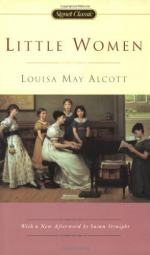“Mother, why didn’t Mr. Laurence like to have Laurie play?” asked Jo, who was of an inquiring disposition.
“I am not sure, but I think it was because his son, Laurie’s father, married an Italian lady, a musician, which displeased the old man, who is very proud. The lady was good and lovely and accomplished, but he did not like her, and never saw his son after he married. They both died when Laurie was a little child, and then his grandfather took him home. I fancy the boy, who was born in Italy, is not very strong, and the old man is afraid of losing him, which makes him so careful. Laurie comes naturally by his love of music, for he is like his mother, and I dare say his grandfather fears that he may want to be a musician. At any rate, his skill reminds him of the woman he did not like, and so he ‘glowered’ as Jo said.”
“Dear me, how romantic!” exclaimed Meg.
“How silly!” said Jo. “Let him be a musician if he wants to, and not plague his life out sending him to college, when he hates to go.”
“That’s why he has such handsome black eyes and pretty manners, I suppose. Italians are always nice,” said Meg, who was a little sentimental.
“What do you know about his eyes and his manners? You never spoke to him, hardly,” cried Jo, who was not sentimental.
“I saw him at the party, and what you tell shows that he knows how to behave. That was a nice little speech about the medicine Mother sent him.”
“He meant the blanc mange, I suppose.”
“How stupid you are, child! He meant you, of course.”
“Did he?” And Jo opened her eyes as if it had never occurred to her before.
“I never saw such a girl! You don’t know a compliment when you get it,” said Meg, with the air of a young lady who knew all about the matter.
“I think they are great nonsense, and I’ll thank you not to be silly and spoil my fun. Laurie’s a nice boy and I like him, and I won’t have any sentimental stuff about compliments and such rubbish. We’ll all be good to him because he hasn’t got any mother, and he may come over and see us, mayn’t he, Marmee?”
“Yes, Jo, your little friend is very welcome, and I hope Meg will remember that children should be children as long as they can.”
“I don’t call myself a child, and I’m not in my teens yet,” observed Amy. “What do you say, Beth?”
“I was thinking about our ’Pilgrim’s Progress’,” answered Beth, who had not heard a word. “How we got out of the Slough and through the Wicket Gate by resolving to be good, and up the steep hill by trying, and that maybe the house over there, full of splendid things, is going to be our Palace Beautiful.”
“We have got to get by the lions first,” said Jo, as if she rather liked the prospect.
CHAPTER SIX
BETH FINDS THE PALACE BEAUTIFUL




